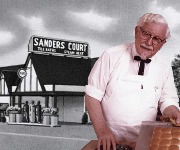Credit-card costs continue to climb!

Since 2007, the Bank of England's base rate has plunged from nearly 6% to just 0.5%. So why is borrowing on credit cards getting more expensive?
The past twelve months haven't been great for the economy. As the UK slipped into recession in the second half of 2008, the Bank of England responded by slashing its base rate. At the start of October 2008, the base rate was 5% a year. Today, it stands at 0.5% -- the lowest it's been in the Bank's 315-year history.
Great news for mortgage borrowers
So, as the base rate has fallen, so too has the cost of borrowing, right? Well, yes and no. On one hand, mortgage borrowers on variable or tracker rates have seen hefty falls in their monthly repayments. Also, fixed rates for new borrowers have come down, making their repayments more affordable.
Alas, outside of the mortgage market, things aren't quite so rosy. Indeed, many British businesses are reporting sharply higher borrowing costs. Likewise, the market for personal loans has been largely unaffected by the collapsing base rate. Three years ago, it was possible to get an unsecured personal loan at under 6% APR. Today, Best Buy loan rates are more like 8% APR.
The crippling cost of credit cards
However, the biggest problem for borrowers is the rising cost of borrowing on a credit card. Indeed, the pattern is obvious: as the base rate has fallen, the cost of borrowing on cards has risen.
The average rate charged on credit-card purchases has risen from 16.3% APR in June 2007 to 18.1% APR today, according to lovemoney.com partner Moneyfacts. Over this two-year period, the base rate has dropped from 5.5% to 0.5%. Thus, while the base rate has gone down by five percentage points, the cost of spending on a credit card has gone up by almost two percentage points.
If a sharply reduced base rate means that lenders can borrow more cheaply, then why are Brits' everyday borrowing costs going up? To many people -- including me -- this seems grossly unfair. Then again, there has never been much of a link between credit-card rates and the base rate. Indeed, whatever happens to the base rate, the cost of borrowing on a credit card has always been sky high.
Nevertheless, it seems to me that card issuers are fleecing borrowers. In fact, I believe that the present margin of 17.6% over base rate is the highest enjoyed by card issuers since I started out in financial services in 1987. Indeed, it could well be the highest margin over base rate enjoyed since Barclaycard launched the UK's first credit card in 1966!
Why are card rates going up?
Lenders -- especially banks -- are using high interest-rate margins to rebuild their blown-up balance sheets. In other words, they're charging as much as they can in an effort to rebuild their profitability. As a nation, we owe around £53 billion on credit cards, of which around £40 billion is interest-bearing debt. Therefore, every 1% hike in interest rates costs cardholders roughly £400 million a year in extra interest.
In order to make more money, card issuers have been steadily raising rates for existing cardholders. In the past six months, twelve cards have increased rates, including those from American Express, Bank of Scotland, Capital One, Halifax and Nationwide BS. Those hit hardest will be cardholders who can afford to pay only their minimum monthly repayments and, therefore, pay the most interest over time.
Also, card firms have been increasing the charges and interest rates for cash withdrawals, foreign-currency fees, introducing annual fees, and so on. Likewise, cards charging below-average rates of interest have been withdrawn, to be replaced by new plastic charging higher APRs.
Of course, lenders will argue that rising unemployment, bankruptcies, insolvencies, bad debts and arrears are eating into their profits, forcing them to widen their margins by raising rates.
The most important thing to bear in mind is that you can fight back by switching to one of dozens of credit cards that charge no interest on transferred debts. These 0% balance transfers can freeze your interest bill for up to sixteen months, giving you a well-earned breather and extra time to chip away at your balance.
And finally...
In my view, it's high time that the government did something to address this rip-off. After all, taxpayers' money was used to bail out several lenders, including HBOS, Lloyds TSB and Royal Bank of Scotland. Frankly, it's criminal that our money is being lent back to us at rates of interest normally associated with doorstep lenders and loan sharks.
In summary: pay attention, prime minister Gordon Brown, chancellor Alistair Darling and business secretary Lord Mandelson, because Britain is sick of being swindled by banks!
More: Find a cracking credit card today | Save thousands with a 0% credit card | Don't be scammed!
Most Recent
Comments
-
I can't help but feel that your articles regarding credit cards tends to act as a promotion for such instruments of the Devil himself. I had a Barclaycard when they first appeared and learnt the hardway many years ago. It was a usful lesson in life as debt levels then tended to be a lot less than today. I haven't had one since and use a debit card. It taught me to be disciplined with my cash and have now debt free for a long time. If I was PM I would ban CCs. Yet articles like these tend to talk about CCs as though they are a necessary part of life. They are like estate agents, we don't actually need them. Also, high street prices are artificially inflated by 3 to 5% to pay the CC commision. Nice work if you can get it, cream off a commission on every sale. If I go to the bank and draw out the cash, it won't cost me anything, so why charge using a CC. I think they should be banned.
REPORT This comment has been reported. -
[b]I AGREE WE ARE BEING RIPPED OFF BUT WE HAVE A VOICE LIKE WE ARE DOING WITH OUR CORRUPT MP S AT THE MOMENT[/b] [b]AS LONG AS WE GRIN AND BARE IT THEY WILL CHARGE AS MUCH AS THEY CAN, THE PEOPLE HAVE THE POWER TO PROTEST IF WE SHOUT LOUD WE WILL BE HEARD, WE HAVE FRIGHTENED THE POLITICIONS NOW START ON THE BANKS, AFTER ALL WE DO OWN PART OF A LOT OF THEM,[/b] [b]BUT CHANGE YOUR CARDS TO LOWER ONES I MUST POINT OUT NOT ALL CARDS HAVE INCREASED IN FACT IF YOUR OVER 50 CHECK THE SAGA CARD GREAT VALUE, IN FACT THEY HAVE REDUCED THERE RATE ON PURCHASES TO 11.9 AND THEY DONT RIP YOU OFF OVERSEAS[/b] [b]DONT BE BULLIED BY THE BANKS WE DO HAVE A CHOICE[/b]
REPORT This comment has been reported. -
Rather than get into the rights or wrongs of using credit cards I thought the topic was about the rip off interest being charged. I BELIEVE WE ARE BEING RIPPED OFF BY THE BANKS and that the government should address this. The OFT has had success over Bank Charges why not this?
REPORT This comment has been reported.
Do you want to comment on this article? You need to be signed in for this feature









28 June 2009